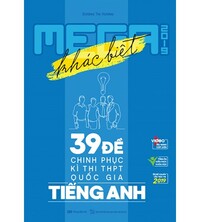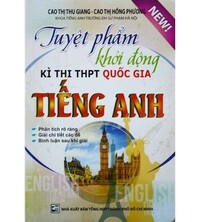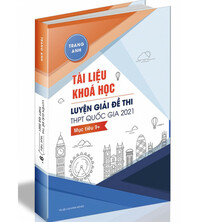Đề thi thử THPT Quốc gia năm 2017 môn Tiếng Anh có đáp án - Đề 23
Đề thi thử THPT Quốc gia năm 2017 môn Tiếng Anh có đáp án được chúng tôi chọn lọc từ những đề thi thử hay, chất lượng của các sở, các trường trong cả nước. Những đề thi thử này sẽ giúp các bạn có điều kiện ôn thi hiệu quả hơn. Chúng tôi chúc bạn đạt được điểm số cao nhất trong kỳ thi tới.
28 đề thi thử THPT Quốc gia môn Tiếng Anh CÓ ĐÁP ÁN - Năm 2017
10 đề thi thử THPT Quốc gia năm 2017 môn Tiếng Anh trường THPT Nguyễn Tất Thành có đáp án
Bộ đề thi thử THPT Quốc gia năm 2017 môn Tiếng Anh CÓ ĐÁP ÁN - Số 4
Đề thi thử THPT Quốc gia năm 2017 môn Tiếng Anh trường Đại học Ngoại Thương, Hà Nội CÓ ĐÁP ÁN
Choose the word that is stressed differently from the rest.
1. A. economy B. economics C. technologically D. institution
2. A. university B. international C. agricultural D. philosophy
Choose the word whose underlined part is pronounced differently from that of the rest.
3. A. achieved B. advanced C. required D. replied
4. A. explanation B. experience C. existence D. exciting
5. A. disaster B. crisis C. basic D. handsome
Choose the best answer to complete the blank in each of the following sentences.
6. Because ______ a lack ______ interest, tomorrow program has been called _____.
A. to/ in/ out B. of/ of/ off C. in/ to/ in D. of/ of/ away.
7. She will never try _______ that again. It was such a nasty experience.
A. to do B. to be done C. doing D. do
8. Let's go to the airport to see her __________.
A. through B. back C. off D. to
9. Those ________ to go with me, please raise your hand.
A. wanting B. who wants C. who want d. A & B are correct
10. Would you like to go to the movies tomorrow? – Sure. By then I __________my exam.
A. will finish B. finished C. will have finished D. have finished
11. __________the fifth largest among the nine planets that make up our solar system.
A. The Earth is B. the Earth being C. that the Earth is D. being the Earth
12. At present Mary __________her clothes. She __________ the clothes on Sunday.
A. is washing/ often washes B. has washed/ is often washing
C. was washing/ has often washed D. washes/ often washed
13. They ________ good preparations before they _______ their final examination yesterday.
A. made/ had taken B. have made/ take
C. had made/ took D. will have made/ have taken
14. Let's put off that meeting to next Monday.
A. postpone B. arrange C. start D. decide
15. German people always say Please when putting a plate in front of a guest _____ English people in that case would say Hope you enjoy it.
A. despite B. when C. while D. though
16. They had a really good chance of winning the national __________.
A. competitor B. competition C. compete D. competitive
17. Lan is very sick now since she hasn't got used __________the cold weather __________the U. S.
A. to/ in B. with/ on C. to/ at D. with/ in
18. Many women __________the countryside have to suffer __________domestic violence as they are not aware of their rights.
A. at/ from B. to/ at C. from/ with D. in/ from
19. I like to __________shopping in the city.
a. doing B. do C. making D. make
20. __________garden looks like a mess. Why don't you cut __________grass?
A. a/ a B. a/ the C. the/ the D. x/ x
21. __________friend of mine gave me __________conical hat as a souvenir.
A. the/ the B. a/ the C. the/ a D. a/ a
22. Even though I kept apologizing, __________.
A. my friend forgives me B. my friend forgave me
C. my friend does not forgive me D. my friend did not forgive me
23. Tom was still keen on his goal __________the fact that it was very hard to achieve.
A. because B. although C. despite D. in spite
24. He __________for Canada two years ago and I __________him since then.
A. left/ did not see B. has left/ have not seen C. left/ do not see D. left/ have not seen
25. The bedroom needs __________now.
A. decorate B. decorated C. decorating D. to decorate
26. It is very kind of you __________me a hand.
A. to give B. given C. giving D. give
27. The villagers in this commune continue to take part in many __________ceremonies.
A. traditional B. traditionally C. untraditional D. traditions
28. "Oh, no. Did I do that? I'm sorry. " – "__________"
A. Oh, that's alright. It can happen to anyone. B. Did i? I'm sorry.
C. I'm worried about that. D. No, of course not.
29. "__________" – "Oh, thanks. I'm glad you like it. "
A. What does your house cost? B. I like your house. It has nice view.
C. I don't know how to get to your house. D. Who designed this beautiful house?
30. The air has become more and more polluted because of exhaust fumes from vehicles.
A. preserved B. wasted C. contaminated D. conserved
Choose the best answers to fill in the blanks:
Some people believe that soon schools will no longer be necessary. They say that (9) ______ the Internet and other new technologies, (10) _______ no longer any need for school buildings, formal class, or teachers. Perhaps this will be true one day, but this is hard to (11) _________ a world without schools. In fact, we need to look at how we can use new technology to make schools better, not (12) _______them. We should invent a new kind of school that is (13) ________to libraries, museums, science centers, laboratories, and even companies.
36. A. despite B. because of C. thought D. because
37. A. there are B. they are C. it is D. there is
38. A. know B. realize C. imagine D. consider
39. A. to eliminate B. eliminative C. eliminator D. elimination
40. A. limited B. linked C. contributed D. addressed
Read the passage and choose the best answers:
Before applying to a foreign university, one should consider the disadvantages of studying abroad. First, a student may feel lonely by being far home and friends. Also, difficulty in understanding a foreign language can be very disappointing and can affect the student's grades. It can be very expensive to pay the costs of travel and housing in a different country. Finally, if there is an emergency at home, it will be hard to get home in a hurry.
However, studying in another country is advantageous in many ways. A student is exposed to a new culture. This culture teaches him or her about other people and other way of thinking, which can be promote friendships among countries. He can learn an new language which may be beneficial for keeping up with research after student has finished studying. He can learn experience not available in his country. The student may also get the opportunity to study at a university where leading expert in his field may be teaching. The leading expert can introduce the student to the most up-to-date finding of the tops researches in the field. Exposure to such available knowledge and insights into the field can aid the student in becoming an expert as well.
41. _______________ to study abroad.
A. There are only disadvantages.
B. There are only advantages.
C. There are both advantages and disadvantages.
D. There are neither advantages nor advantages.
42. When studying abroad, a student ____________.
A. is homesick and feel lonely
B. spends a lot of money for accommodation and transportation
C. cannot go home immediately in emergency.
D. All are correct.
43. When studying abroad,a student is exposed to a new culture that ________________
A. has no advantage.
B. enriches his knowledge about people and other ways of thinking.
C. has no effects
D. causes some troubles
44. At a foreign university, a student ___________.
A. can learn a foreign language. B. cannot learn a foreign language
C. has to learn his mother tongue D. doesn't have to learn a language
45. At a foreign university, a student may ___________.
A. meet his neighbor B. travel a lot
C. meet a leading expert in his field D. All are correct
Choose the sentence that is closest in the meaning to the root one.
46. "Would you like to stay for dinner?" she asked me.
A. He asked me if I liked to stay for dinner.
B. She was very kind to offer me the dinner.
C. He offered me a dinner.
D. She invited me to stay for dinner.
47. "Whose car did you borrow last night?" I said to him.
A. I said to him whose car did he borrow last night.
B. I told him whose car had he borrowed the night before.
B. I ordered him whose car he had borrowed the night before.
C. I asked him whose car he had borrowed the night before.
48. if/ I/ have/ money/ I/ buy/ a new suit
A. If I had enough money, I will buy a new suit.
B. If I have enough money, I will buy a new suit.
C. If I have enough money, I would buy a new suit.
D. If I had enough money, I bought a new suit.
49. "Do you enjoy living in the city?" asked the man.
A. The man asked if I enjoy living in the city.
B. The man wanted to know if I enjoy living in the city.
C. The man said whether I enjoy living in the city.
D. The man wanted to know whether I enjoyed living in the city.
50. what/ foreign/ languages/ taught/ are/ in/ schools/ your/ country?
A. What foreign languages are taught in schools in your country?
B. What are foreign languages taught in schools in your country?
C. What languages foreign are taught in schools in your country?
D. What foreign languages are taught in your country in schools?
------THE END------







